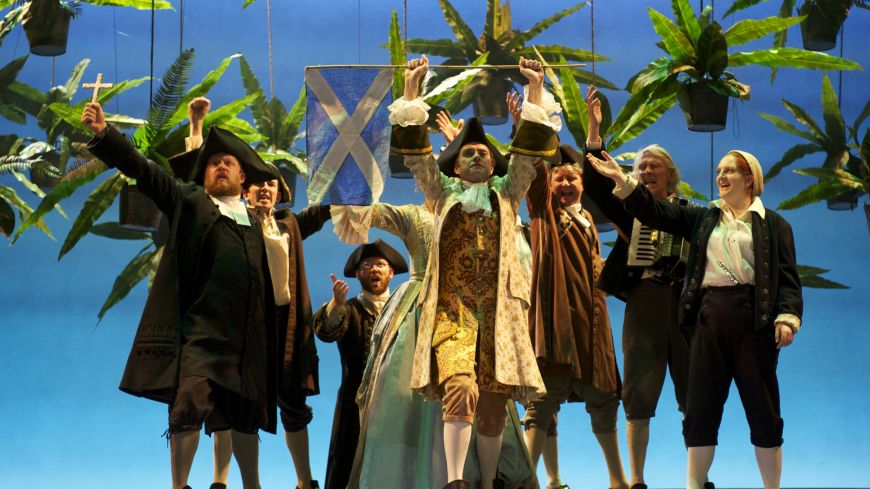
‘Caledonia’ is an undeniably ambitious undertaking, rather like the project it seeks to portray. Remembered by at least some of us from school history lessons, the Company of Scotland Trading to the Indies and its project to colonise the Isthmus of Panama for Scottish interests still seems to exert a malign influence on the nation’s psyche, the failure of the scheme possibly contributing to the so-called ‘Scottish cringe’.
Whatever the reality or otherwise of that condition, Scotland’s ‘imperial moment’ continues to fascinate, and a large audience in the King’s Theatre were clearly ready to be drawn into whatever parallels Alistair Beaton and a National Theatre of Scotland company were going to draw with our present precarious financial state.
Any two-act play is unavoidably a game of two halves, but this is particularly so with Caledonia. The first act is essentially dramatised documentary in a style television has accustomed us to, while the second adopts a mixture of approaches, none of which the actors seem, understandably, comfortable with.
From a rehearsal of the founding of the Company and the decision to establish a Central American colony, we move to an isthmus full of strange noises, including a cheery wee (presumably) Panamanian number, ideal for the i-pod but distinctly out of place here. The fate of the colony and its members occupies a large part of the second act, while the subsequent twelve years leading to the Treaty of Union takes up little more than as many minutes.
This feels frustrating, especially as the irony of the founder of the Bank of England – William Paterson (ably played by Paul Higgins), moving spirit also of the Company of Scotland – encountering English hostility toward his scheme, is lost in the rush toward pantomime. This tendency extends to King William III, here foppishly hypochondriacal – William may have been chary for his health, but the man who ruthlessly altered his Stadtholderate to regal status, governed four nations and fought and ultimately won a major war against the super-power of the day deserves more characterisation than Cliff Burnett is offered here.
William’s Scottophobia probably owed more to extreme Presbyterian divines than any love for England, but in any case any finger of blame in this case points more toward the Corporation of the City of London than an otherwise-occupied Crown. But, you may protest, Caledonia is play, not history. Undeniable, but other writers have presented more complex arguments with more drama than Caledonia offers.
This is very real pity, as there’s considerable talent on display here, and even in smaller parts, no small actors. Set design and lighting both match the scale of ambition and offer the cast a worthy setting for their considerable efforts. However, it’s not unfair to state, with perhaps more justification even than the investors in the Company of Scotland, we wis robbed.
Caledonia runs at the King's Theatre as part of the Edinburgh International Festival from 21 to 26 August at 7.30pm

